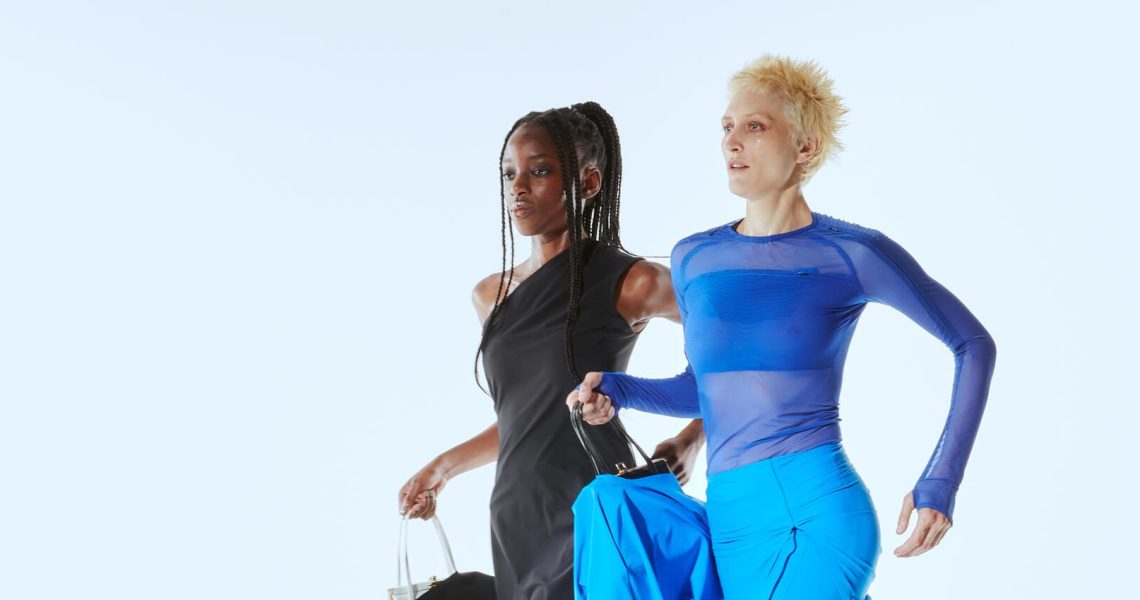Three years on, Brexit is still impacting both U.K. and Europe-based brands in luxury fashion. Niche and young brands, in particular, are having a hard time with the fallout, though many have secured manageable workarounds. For example, some are now foregoing shipping goods to the U.K. altogether, while others have moved their production to Portugal. And others have developed new working relationships with manufacturers in the U.K.
“I’ve found that it’s easier to ship to the U.S. than to ship to the U.K,” said Anne Rasmussen, founder of Anne Isabella, a Berlin-based fashion brand focused on vintage-inspired clothing. The designer, previously at Kenzo, Jil Sander and Courrèges, founded her brand in 2020 and has dealt with Brexit-related challenges since day one. “Even when loaning products to press, I have to rule out sending things to the U.K. because it’s too difficult to ship there. Generally, it’s just not easy for brands to work with U.K. companies, at the moment,” she said. Among new shipping struggles are rising costs, new red tape and required forms, and regular delays.
Instead, Isabella has focused on Europe and the U.S. retailers for sales, as well as international wholesale partners. Online retailers including Canada-based Ssense and L.A.-based H. Lorenzo, as well as Nordstrom in the U.S. and Voo Store in Germany, now sell limited Anne Isabella collections of 50 items each. Although the company does not disclose exact sales, it estimates that the U.K. previously drove 20% of its sales, but its wholesale business has since picked up that 20%.
Other brands that had largely sold their small, high-end collections through direct channels — both to control the supply chain and keep customer costs down — have now taken a similar approach and relying on wholesale partners.
Nina Hopkins, founder of London–based ethical fashion brand Jakke, which showed at London Fashion Week, has also made shifts within the business, in response to Brexit. “Brexit has been crazy for us. We’ve lost a lot of the online European customers we had before, due to the rising cost of shipping,” said Hopkins. “We’ve combatted that by going bigger into wholesale.” The brand, known for its faux fur coats and accessories, is now stocked by U.K. retailers including Harvey Nichols, Fenwick, Brown Thomas, The Iconic, Rinascente and Selfridges. Hopkins plans to further expand Jakke into wholesale with the launch of the fall 2023 collection.
U.K. brands manufacturing within the country have seen other challenges.
“Brexit made us rethink how we do production. Before, we were getting fibers from Italy and then shipping them to the U.K.,” said Paolina Russo, founder of 3-year-old knitwear brand Paolina Russo and an LVMH Prize semi-finalist. The brand produces its technical sports knitwear pieces in limited runs. It’s collaborated with Adidas and been worn by Beyoncé. It’s currently stocked on Ssense.
“We went to Leeds and found a spinner who specializes in wool fibers. All of its fibers are sourced from U.K. sheep. So we’ve moved that step in the supply chain to the U.K.,” said Russo. Typically, small U.K.-based source materials from Italy or Portugal, where they can work closely with artisans and small manufacturers to achieve high-quality goods. Shifts from Brexit are allowing niche designers to continue working with high-end materials, but without the additional costs of shipping raw materials from Europe.
According to the U.K. Fashion and Textile Association (UKFT) survey from 2021, 98% of U.K. fashion businesses experienced higher costs through bureaucracy and paperwork, 92% experienced increased freight costs, 83% increased customer costs, 53% saw canceled orders from E.U. customers, and 44% saw an increase in product returns due to customs costs and VAT issues. The red tape has continued into 2022 with few changes, according to experts at British policy think tank the Fashion Roundtable, which has been analyzing Brexit’s impact since 2020.
Designer Johanna Parv, based in London, is planning to move her U.K. business to Portugal or Italy to regain some quality control lost by Brexit. She founded her namesake fashion brand in 2020. after previously working at Burberry and Balenciaga. In addition, Parv is considering shifting the brand’s production from its current London manufacturers to Portugal or Spain, based on rising logistical costs of raw material shipping. Her technical outerwear and minimalist workwear require detailed craftsmanship and features like hidden zippers, which can be expensive to correct when the work goes unsupervised.
“The idea is to move closer to where some of my raw material sourcing is right now, in Portugal or Italy,” said Parv. “Production is now based in London, but for many of the technical garments, I need to retrain manufacturers to do things differently. With customs, everything has gotten much more complicated, with forms needed for every package and additional costs at borders. I need to be to keep up the quality.”
“You get used to it, and you kind of go along with it,” said Parv, in regard to Brexit’s impact. “But you do question why it has to be like this.”




